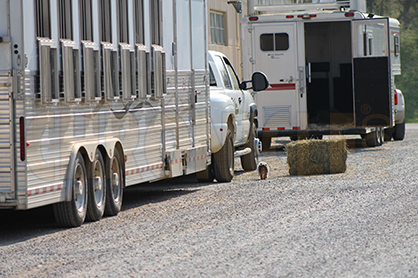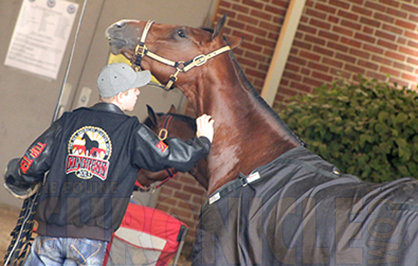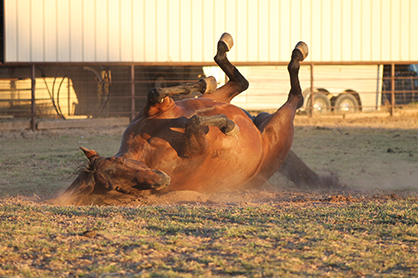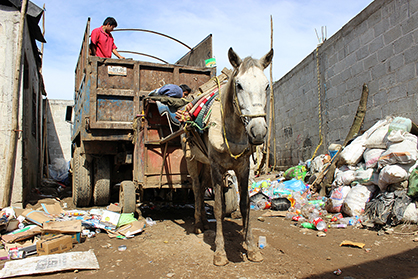Spring Grass is Coming- is Your Horse Ready?
January 9, 2015 Comments Off on Spring Grass is Coming- is Your Horse Ready?
“Horses with metabolic issues are even more susceptible to the high level of sugars (which are mostly fructans) in spring grass,” said integrative and complementary veterinarian Dr. Joyce Harman, founder of Harmany Equine.
Continue reading …Rethinking the Horse Business 2015 Online Seminar – Succeeding In a Changed World
January 7, 2015 Comments Off on Rethinking the Horse Business 2015 Online Seminar – Succeeding In a Changed World
“Rethinking the Horse Business” covers essential information about how the economy, horse industry demographics, and the Internet are affecting horse business owners. Horse professionals will gain important insights and strategies to help them succeed in the current business climate and beyond.
Continue reading …Keeping Horses Comfortable in the Trailer During Winter Travel
January 1, 2015 Comments Off on Keeping Horses Comfortable in the Trailer During Winter Travel
Most horses in the show industry are kept under lights for 16 hours or more per day to prevent a winter coat from growing; thus calling for heavy layered blankets during subzero temperatures.
Continue reading …Check Out the Clinician Lineup For 2015 Equine Affaire!
December 31, 2014 Comments Off on Check Out the Clinician Lineup For 2015 Equine Affaire!
The 2015 event will offer a comprehensive schedule of clinics, seminars, and demonstrations by nationally and internationally recognized trainers, competitors, and coaches including Guy McLean, Chris Cox, John Lyons, Julie Goodnight, Dan James, Scott McFarland (Reining), George Williams (Dressage), Barbra Schulte (Cutting), Jane Savoie (Dressage), Bob Giles (Driving), Tom Chown (Western Pleasure/Horsemanship/Showmanship), Doug Leasor (Barrel Racing & Pole Bending), Gayle Lampe (English Pleasure), Kevin Oliver (Ranch Horse Versatility), Drew Emnett (Hunter Under Saddle), and Gary Lane (Easy Gaited Horses). Clinicians are also being confirmed for jumping and other disciplines.
Continue reading …Baylor Equine-Veteran Research Program Awarded $50,000 Grant
December 31, 2014 Comments Off on Baylor Equine-Veteran Research Program Awarded $50,000 Grant
The research team will be assessing 75 veterans participating in 5 different programs or test sites. The participants will not be receiving therapy from therapists in this program – they will be learning to ride and to care for the horses.
Continue reading …Are You Ready For Winter? Part 5- Keeping Horses Fit During the Off Season
December 24, 2014 Comments Off on Are You Ready For Winter? Part 5- Keeping Horses Fit During the Off Season
The colder temperatures of winter often mean a decline in physical activity—for both human and horse. Still, you don’t want your horse to get flabby and lose all the conditioning you worked so hard for during the summer… so what should you do?
Continue reading …Does That “Hay Belly” Really Mean Your Horse is Fat?
December 23, 2014 Comments Off on Does That “Hay Belly” Really Mean Your Horse is Fat?
A distended abdomen is often referred to as a “hay belly” to describe an overweight horse, even when the rest of his body is normal, but actual fat does not accumulate extensively on the horse’s lower abdomen (belly).
Continue reading …Important Cold Weather Health Tips For Horse Owners
December 23, 2014 Comments Off on Important Cold Weather Health Tips For Horse Owners
Horses expend significantly more calories keeping warm in the winter than they do any other time of year. High-quality hay should be the staple of any winter diet, especially for horses that are out a lot.
Continue reading …New Research Collection Published to Help Welfare of Working Equids
December 18, 2014 Comments Off on New Research Collection Published to Help Welfare of Working Equids
In July of this year, more than 150 representatives from 27 countries attended the 7th International Colloquium on Working Equids to discuss the plight of the estimated 100 million working horses, donkeys and mules who sustain human livelihoods around the world.
Continue reading …UC Davis Conducting Online Survey to Identify Trends in Performance Horse Care and Links to Show Ring Success
December 16, 2014 Comments Off on UC Davis Conducting Online Survey to Identify Trends in Performance Horse Care and Links to Show Ring Success
The Center for Equine Health at the University of California, Davis, is conducting an online survey that seeks to “identify current trends in performance horse care linked to wellness and success in the show ring.”
Continue reading …







